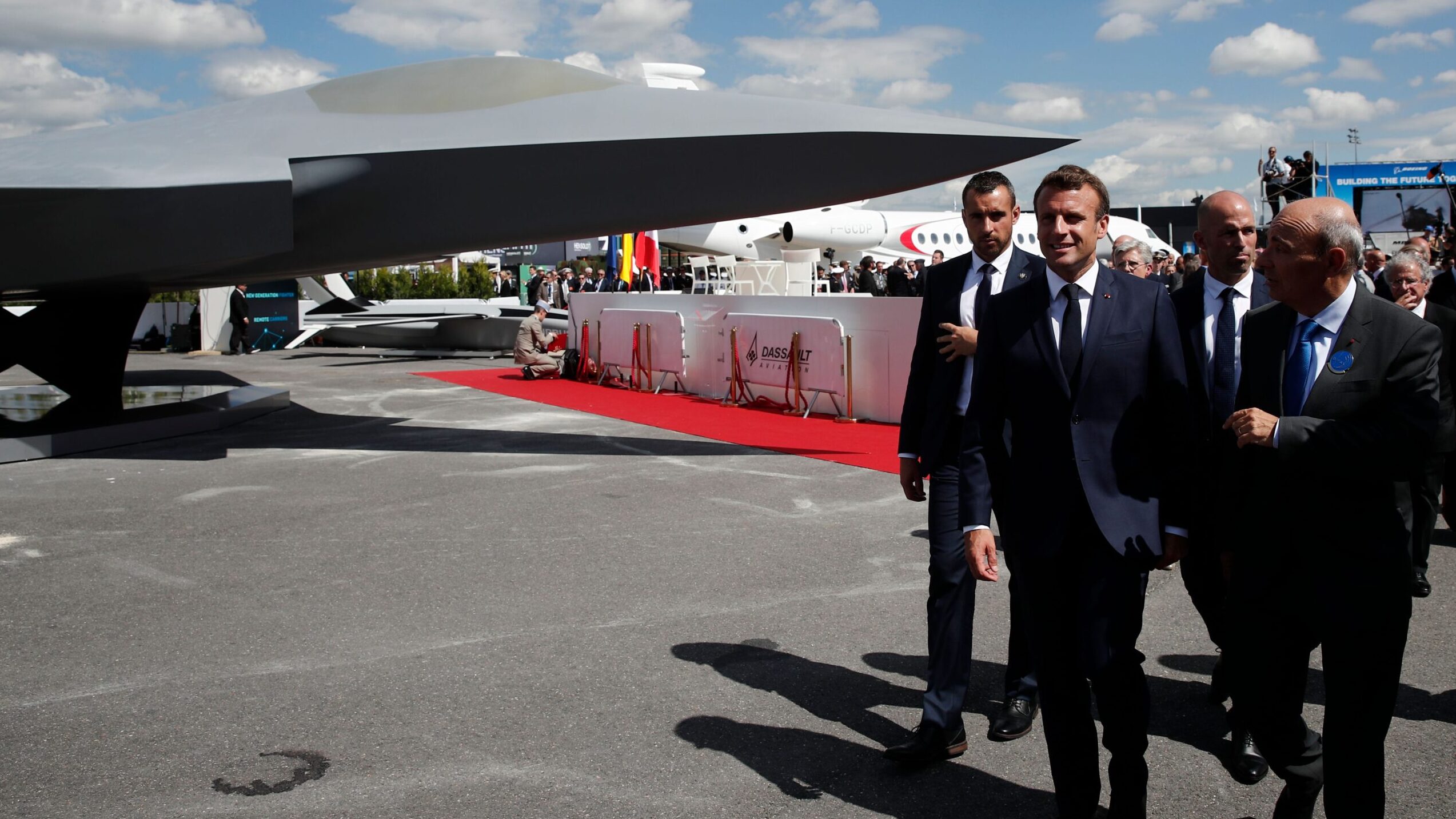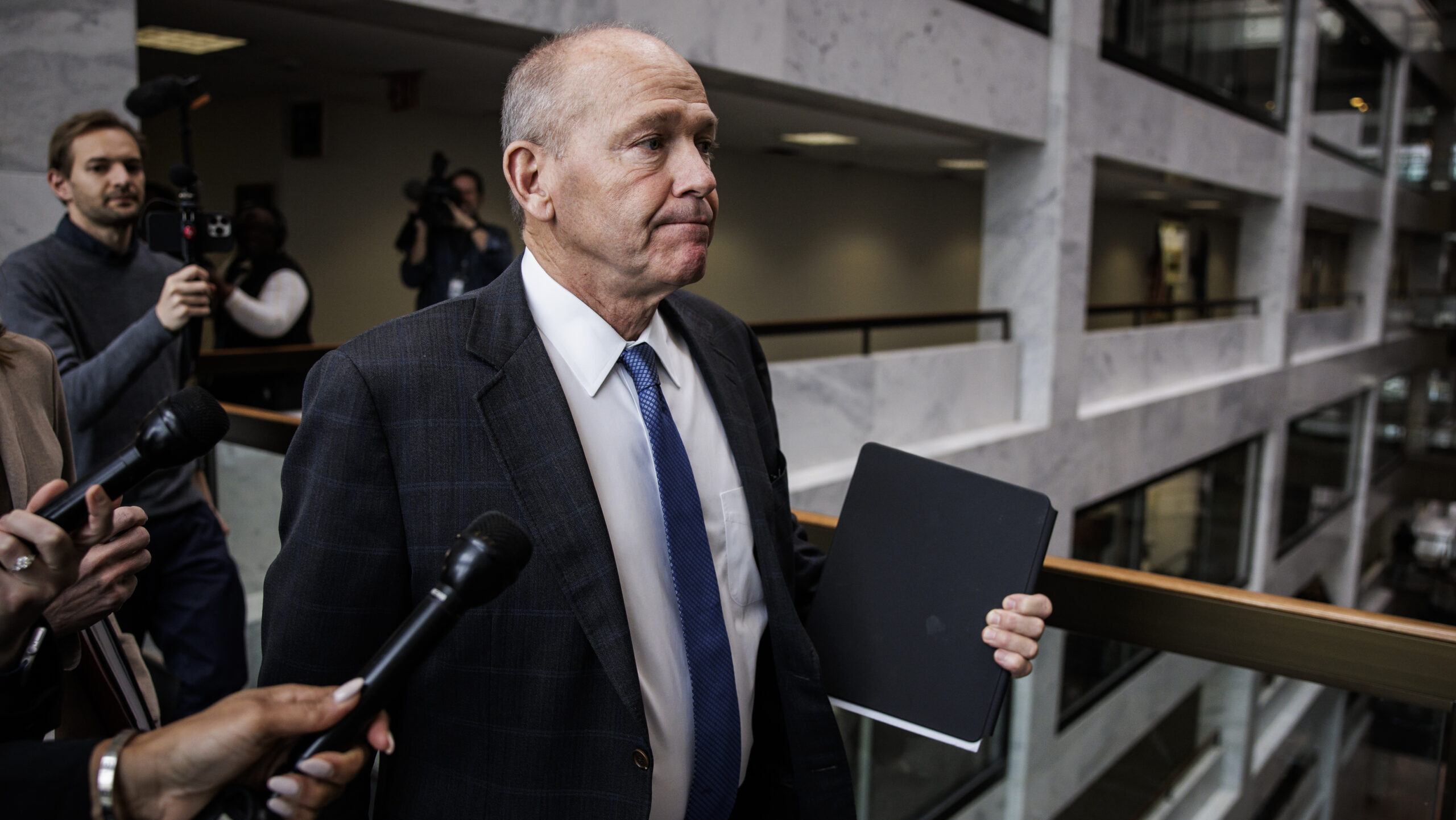
French President Emmanuel Macron talks with Eric Trappier, Chairman and CEO of Dassault Aviation, after the unveiling of the full-scale jet fighter model of the Systeme de Combat Aerien Futur (SCAF), during the 53rd International Paris Air Show at Le Bourget Airport near Paris, on June 17, 2019. (BENOIT TESSIER/AFP via Getty Images)
PARIS AIRSHOW — French President Emmanuel Macron officially announced on Monday evening that Belgium was joining the Franco-German-Spanish SCAF future combat air system.
And though he said Brussels would take part “initially as an observer,” he said the nation’s inclusion in SCAF, also known confusingly as FCAS, was a “major evolution” that would serve to “further anchor in Europe this project at the heart of tomorrow’s air defense system.”
In a statement to Reuters, Ludivine Dedonder, Belgium’s minister of defense, confirmed the move, saying Belgium’s observer status would last between six to twelve months.
Macron made the announcement during remarks at a conference on European air defense attended by NATO chiefs and government officials on the first day of the Paris Air Show. The conference was organized to try and harmonize European positions in the wake of Germany’s Euro Sky Shield program, launched last October.
The French president also announced that France, Belgium, Cyprus, Hungary and Estonia had signed a letter of intent (LOI) to jointly purchase Mistral transportable lightweight anti-air missiles manufactured by European joint venture MBDA. An official from the president’s office was quoted by French media as specifying later that the LOI involved “several hundred” missiles and stressed it was “the first case of a joint purchase of this type of material.”
In a statement, Estonian defense minister Hanno Pevkur said “By jointly procuring from a European manufacturer, we can also apply for support from the European Union. Our goal is to maximise defence capabilities for every euro invested in national defence.”
Elsewhere in his talk, Macron revealed that the Franco-Italian anti-aircraft missile Aster 30-SAMP/T Mamba was now deployed and operational in Ukraine. This 450 kilogram (992 pound), 4.9 meter (16.08 foot) long, ground-to-air missile with a range in excess of 100 kilometers (62 miles), made by MBDA, is designed to protect sensitive sites and deployed forces from missile threats and aircraft.
Speaking today at the air show, Dassault CEO Eric Trappier reacted positively to the news. That was notable, as he made it very clear at the end of May that he was opposed to it being opened to other countries on grounds that it was difficult enough with three partners: France, Germany (with Airbus) and Spain (with Indra).
Today, Trapier said he “welcomed” Belgium as an observer, before laughing and noting “Which is better than what I said before.”
Macron Argues Against Euro Sky Shield, If Not By Name
Earlier in Macron’s 15-minute speech, without ever specifically mentioning it by name, he made a clear criticism of the Euro Sky Shield, which has been joined by 17 European nations but not by France, Italy, or Poland, saying that “air defense is a question of strategy before it is a question of capacity. If one buys immediately and massively off the shelf stuff that is useless, it generally implies buying massively non-European.”
He argued that “on a vast territory like Europe it would be totally illusionary, indeed downright dangerous, to think that we can create sort of impenetrable bubbles behind which we might think we are safe,” adding that “an Israeli-type Iron Dome is not applicable over a territory that is 200 times bigger.” (Just last week a German parliamentary committee approved funding for Israel’s Arrow 3 missile defense system.)
He pleaded for Europeans to harmonize their standards, and buy European.
“Why are we too often obliged to buy American?” he questioned. And then provided his own answer: “Because the Americans have standardized much more than we have and that they even have federal agencies that massively subsidize their industries.”
He said that if Europe could agree on standards “we would be stronger as an army, we would be able to develop an industrial base for our defense and technology industries that would create jobs here, we would be making good use of our taxpayers’ money and would gain in sovereignty because we would be less dependent on technology choices.”












